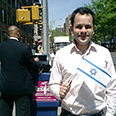
Pro-Israel students take back campuses
Massive anti-Israeli rallies have become routine, and animosity for Israel has moved into the academic field, but pro-Israel supporters are fighting back
Let’s start with the bad news. The number of anti-Israeli demonstrations and activities on American campuses was at its peak last semester since the start of the Palestinian uprising in 2000, public relations statistics showed.
The good news is that the general opinion towards Israel has improved slightly.
So how do these two contradicting facts add up? The answer is simple - the pro-Palestinian organizations are continuing their battle and even intensifying it. Only now, the pro-Israeli groups are fighting back in a stronger way.
Since the start of the uprising, several college campuses have turned into scenes of anti-Israeli sentiment. While the majority of Americans sympathize with Israel, at some of universities, anti-Zionism and empathy for the Palestinians has become all the rage is has turned into a “cool” goal.
I attended a University of California-Berkeley rally that protested against alleged mistreatment of janitors, and one of the speakers decided to voice anti-Israeli slogans as well. In other words, Israel has become a regular target for whoever wants to protest against injustices.
Anti-Israeli sentiment
Massive anti-Israeli rallies have become routine. Palestinian speakers are greeted on campuses as heroes. Students have protested Israel’s presence in the West Bank and Gaza by setting up mock walls and checkpoints at the entrances to colleges.
Animosity for Israel has also slipped into academia. Some universities have prevented students from studying in Israel, citing security reasons. Calls to boycott Israeli academic institutions are made frequently, and some professors slam Israel under the cover of “academic research” and “free speech”.
A poll by Israel on Campus Coalition, which facilitates between Israeli groups on campuses, showed that many Jewish students spoke of intimidation by professors and anti-Israeli advertisements in academic material.
At Columbia University, Middle East studies professors were accused of making anti-Israeli statements and administrating a “terror atmosphere” for whoever made a retort.
Students reponding
Today, the students are responding. Five Columbia students decided they could not remain silent and gathered witness testimonies on video on what had gone on in classrooms. The tapes turned into a cult hit, the school was presented in an embarrassing light and the administration was forced to carry out structural changes to deflect the criticism.
Read these special pieces on the Columbia situation, written exclusively for Ynetnews by former Columbia student activist Noah Liben:
Also, students today, more than ever, are signing petitions and putting political pressure on the administration. Others are initiating demonstrations, organizing celebrations on Israeli topics and creating pro-Israel websites.
The pro-Palestinians have in response turned to guerilla tactics. Instead of confronting the large forces, they are concentrating their efforts in small, isolated colleges, where the Jewish and pro-Israeli populations are minimal and insignificant.
Eytan Schwartz, a 30-year old journalist from Tel Aviv, recently won Israel's most successful reality TV show, "The Ambassador." Schwartz is spending the year in the U.S. working for Israel at Heart. He is writing a regular column about his experiences for Ynet and Ynetnews










